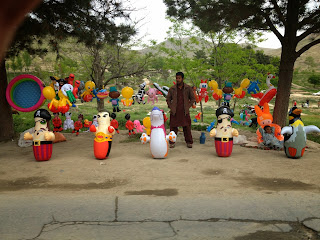What is it like to live in Afghanistan?
I know, I know. What a broad question. I love getting asked, though, because I love getting to share my experiences, and broad questions mean I can choose how to answer.
So for this post, I want to focus on the differences among expatriate life in Afghanistan and how particularly unique my experience was.
In general, there seem to be two types of expats, at least in Afghanistan. One type works for the UN or an embassy or some other governmental-ish organization. They often live in big compounds with high walls and lots of guards. Many can't easily leave their compounds, and in order to do so, they have to get permission, have the site checked in advance, drive in an armored car. (I rode in one of those once. The doors are so heavy!) Since they can't leave often, their compounds tend to have everything they need: restaurants or cooks who make Western food, fitness centers or free open areas, libraries, gardens, and more. They don't often learn to speak much Dari/Pashto; when your drivers and friends and coworkers all speak English, why learn a new language? On the compound, they have more freedom to wear what they want, so they seldom spend their days wearing a head scarf. A lot of them get fairly frequent R&Rs; if you work for the UN, you get several thousand dollars every six weeks, I think, to go to another country for a break.
The other type of expat works mainly for small firms, often nonprofits. Most don't earn much or get any of the other perks: no gyms, no fitness centers, no libraries :( Most make an effort to learn the language, and some become very fluent. Since they speak the language and aren't high profile targets, they often have more freedom to move around, sometimes even on foot, but the lack of security sometimes means that these expats end up in danger as well. Many still live in compounds, although less heavily armored, and many of their compounds have a guard at the gate and barb wire on the walls to protect the gardens that are their havens. They often move to Afghanistan with their whole families, so they form children's playgroups and attend elementary school plays and small groups.
I was the second kind of expat. Sort of. My life was different, especially when I lived with my Afghan family. Lots of Dari, no armed guards or vehicles. My house didn't have a garden, or hot water, or electricity for a lot of the winter. I wore a head scarf, long sleeves, long pants, shirts or skirts that covered my backside. But I had the freedom to walk, to buy from street vendors, to meet and befriend so many Afghans that approximately a third of my Facebook friends are from Afghanistan now. I didn't have a driver or chaokidar (guard), so I ran my own errands and did my own shopping, which helped my Dari improve even more. I watched four-year-old girls dancing in their driveway until my accent ("She's a foreigner!") scared them away.I fell into the sewer, and I got to know the naan shop guys, and I kicked soccer balls back into play when I walked past games of street soccer. I learned so much about Afghanistan's country, its history, its conflicts, its hope for the future. I learned about what life is actually like there, because I lived closer to that life than most any other expat I knew.
Having never been the first two kinds of expats, I can't really judge. But I have to say... my kind of expat life is the only kind I'd choose. I got to really live in Afghanistan. Not behind locked walls. Not a Western life that just happens to be physically elsewhere. There were dangers and frustrations and moments of self-pity, but they passed. Ninety-nine percent of the time, I loved my life in Kabul.
So what's it like to live in Afghanistan?
Wonderful.
(Photo credit for 1-3 goes to Maryam Akbari.)







No comments:
Post a Comment